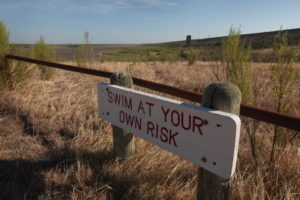Janet Rummel, public relations and communications officer for the North Texas Municipal Water District, has a possible word to the wise to city officials who might be reluctant to enact water-use restrictions in the face of a punishing drought.
If you are concerned about a loss of revenue collected from water use fees, then your reluctance to impose water conservation measures carries even greater risk.
You will run out of water, Rummel warned in remarks to the Rotary Club of Fairview.
Much of the state remains caught in drought conditions. The Texas Panhandle, where my wife and I lived until this past May, went through an entire winter with any measurable precipitation. No snow. No rain. Nothing!
North Texas didn’t fare much better than the Panhandle, as I have learned.
So, cities that are pondering whether to impose restrictions on water use face the mother of conundrums: Do they interfere with their revenue stream, depriving their municipal coffers of money used to fund various public services?
The NTMWD, based in Wylie, serves about a dozen communities north and east of Dallas. Rummel talked about the array of measures that the district has taken to improve the quality of water; it also is planning to spend a significant amount of money to improve the delivering of water.
From my standpoint, a city that faces the prospect of running dry — of losing its water supply — has no choice whatsoever than to impose limits, even if it chokes off the revenue it uses to pay for the myriad municipal services it provides. Moreover, I am amazed that city officials would be so reluctant to take a proactive stance that conserves this priceless natural resource.
And yet, according to Janet Rummel, cities are wringing their hands over such a decision. I find the quandary a non-starter.

I agree with the conundrum. Conservation is important and revenue is important. But compromise (a word that is foreign to governments is needed. I have suggested to deaf ears, that all newly developed areas (homes and business) adopt a policy like Albuquerque. New construction landscaping must be low water, drought tolerant plantings. All irrigation in new development must be drip type to limit evaporation and watering of streets and driveways. Existing systems can be retained, but water usage is based the prior years usage, before implementation of the new rules. That becomes a base. Your water usage at or below that base with be at the old rate and above that base will be at a higher rate that can be raised.